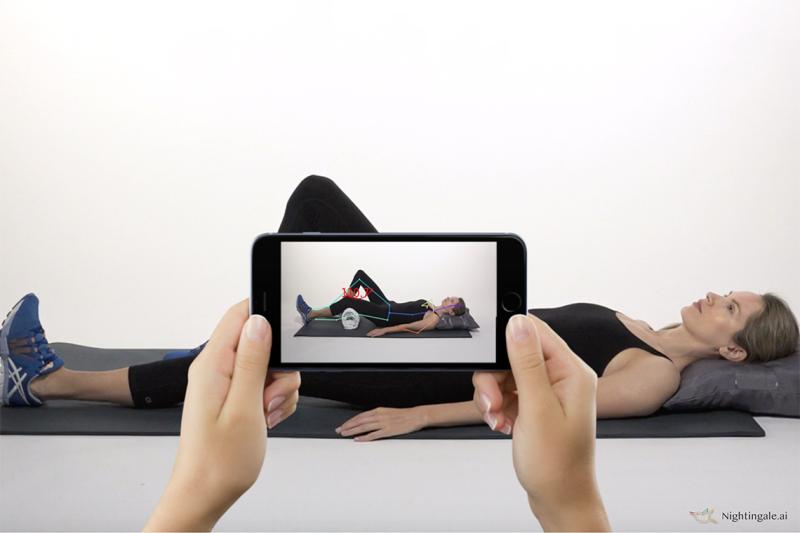September 28, 2021 | Alumni
Nightingale.ai wins seed funding for virtual physiotherapy app
By Tyler Irving

Nightingale.ai connects physiotherapists and their patients remotely, leveraging vision-based AI to analyze patient progress. The goal is to lower the cost of providing physiotherapy while enhancing outcomes, both in the near and long term. (Photo courtesy of Nightingale.ai)
Alumni startup Nightingale.ai, an AI-enabled platform that enables physiotherapists and their patients to connect remotely, is one step closer to commercial viability after Hatchery Demo Day 2021, held virtually throughout the week of September 13 – 17, 2021.
The online platform can be used by physiotherapists and their patients who are rehabilitating following knee or hip replacement surgeries. It uses vision-based artificial intelligence to detect and analyze the same kinds of parameters that physiotherapists look for during in-person visits, including how the surgical incision looks, how the patient is walking and how a new joint is moving.
Using this information, the platform can recommend a treatment plan or schedule in-person appointments as needed. By facilitating more frequent interaction and a better exchange between physiotherapists and their patients, Nightingale.ai can improve outcomes while lowering the cost of care. It also provides rich data on recovery outcomes that can be used to further optimize care for future patients.
“As a group of clinicians, engineers and researchers who have worked in the physiotherapy field for many years, we are very familiar with the problems encountered by both patients and providers during the rehabilitation journey,” says Sameer Chunara (BSc 2000 UC, BEd 2001), CEO of Nightingale.ai and an advanced practice physiotherapist and owner of a community clinic in Toronto.
“We have been surrounded by a team of advisers who have helped us focus on what is really important at this stage.”
Read more about Nightingale.ai at the Lawrence S. Bloomberg Faculty of Nursing
The team plans to use the funding they received to augment their core team of engineers and continue developing and testing their platform. They hope to have a beta version in the next six months.
In addition to Chunara, Nightingale.ai includes: alumni Donovan Cooper (MHSc 2017), manager of site operations at Altum Health and U of T Assistant Professor Charlene Chu (BScN 2006, PhD 2016) of the Lawrence S. Bloomberg Faculty of Nursing. The team also includes biomedical engineering PhD candidates Meng-Fen Tsai and Chao Bian.
A total of 17 teams competed in the Hatchery NEST process, an experiential learning opportunity that instills and nurtures an entrepreneurial mindset in participating U of T students and faculty.
Over the summer, participants met potential co-founders, developed their business plans and got connected with mentors who offered support in various areas, including market research, branding and securing intellectual property. The program culminated on Demo Day, with teams pitching their startup ideas to a panel of judges, including entrepreneurs and investors, some of whom are themselves former Hatchery participants.
The five winning teams will share $80,000 in seed funding, which will help take their companies through the next phase of their development.
“Hatchery Demo Day is my favourite way to kick off a new academic year,” says Chris Yip (BASc 1988), Dean, U of T Engineering. “I’m always impressed by the creativity, the professionalism and the energy of these dynamic students, and I look forward to watching them grow in the years to come. On behalf of the Faculty, congratulations to all the teams that participated this year, as well as to Joseph Orozco and his whole team at The Hatchery for making this possible.”
Two more of the winning startups included U of T alumni on their teams: Civvic, an AI-enabled web platform for developers and urban planners, and ParkinSense, a medical monitoring system for people living with Parkinson’s disease. Read more at U of T Engineering.

